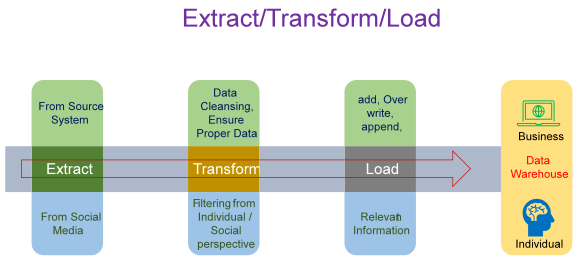ETL even though a very old concept, its popularity made it prominent in 1970.
The non-software fellows (like me) must be wondering what I am referring to, yes same was the case with me when I first time heard the term ETL.
I know I have taken lot of time but have not talked about what ETL stands for. In data warehousing ETL stands for Extract/Transform/Load.
Recently, while going through some of the literature on Data, I encountered this term after many years. Meanwhile as a regular practice I was cleaning the social media inputs, which is my weekly exercise. Some time you really get fed up with all good mornings, have a nice day, thought for the day messages. I was thinking how this ETL is relevant in today’s context of data overload in personal life. Because of advancement of technology on one side we are well connected, but I think, day by day we are getting emotionally disconnected. We are overloaded with data and some time it becomes too much.
Let’s understand the ETL concept as used in “IT” industry. It is a general procedure of copying data from one or more sources into a destination system which represents data differently from the source or in a different context than the source. Gotcha, you caught me and you are right, this is how it is defined in Wikipedia.
Going forward again from Wikipedia, properly designed ETL system extracts data from the source, enforces data quality and consistency standards, conforms data so that different sources can be used together, and finally delivers data in presentation ready format so that developer can build application and end user can make decision.
Some of you have already guessed where I am driving this point. In today’s personal life, the social media is throwing so much data at you, that person is fatigued at receiving, analysing (if he really does) and acting on that data. (Here I am not referring to “Forwarding”, but actually put to use). Now a days, I hear people saying abstaining from social media, somebody told me he is on vacation from social media, while the best term I came across was sabbatical from social media.
This means there is a mental fatigue because of overdose of information / data. During last one year as the WFH was/is in vogue, individuals are expressing / realising the value of human interaction in BC (Before Covid) era. Hence the social media are buzz with remedies, precautions, advises and so on and so forth.
So, if you are experiencing data fatigue, why not try ETL in social context.
Now if you apply ETL, then system Individual Reads data from the social media, enforces Personal data quality and consistency standards, conforms data so that different sources can be used together, and finally Absorbs / Rejects data so that Individual can build Wisdom andnSelf or to whom he forwards can make use of information wisely.

Another thought, can we apply “Blockchain” in social media? Confused? So am I, will write about this once I gather more insight.

